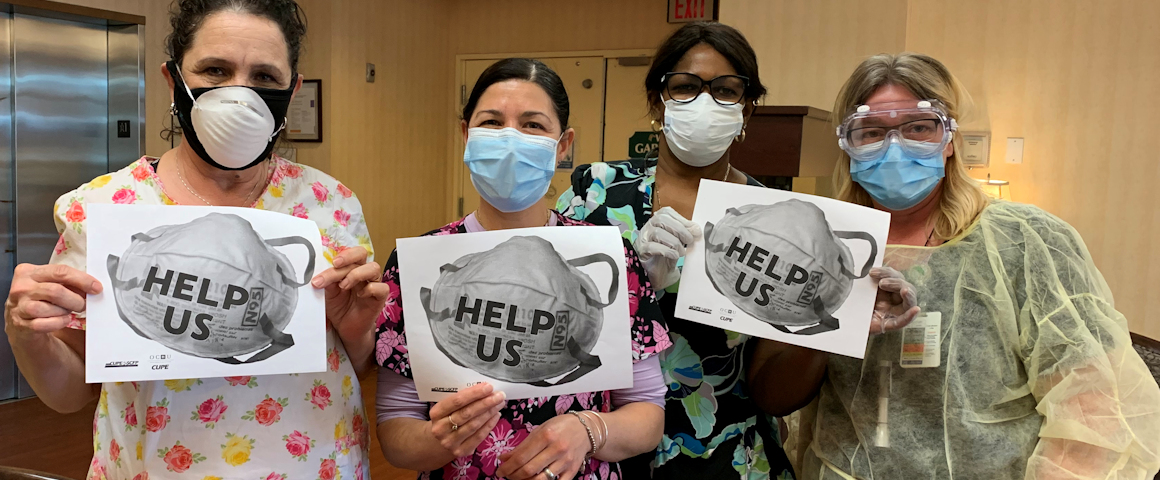PV Ontario Bureau
The pandemic currently gripping the world has exposed the precarious conditions in long-term care (LTC) homes in Ontario. Seventy-five percent of the deaths from coronavirus have been seniors who live in these homes. Out of a total of 626 long-term care homes in the province, there have been outbreaks (defined as two or more reported cases) in over 145 and this number grows every day. Several compounding factors have contributed to this crisis, but the root cause has everything to do with capitalism’s drive towards commodification and exploitation.
Ontario has the highest proportion of for-profit nursing homes in Canada – a whopping fifty-eight percent of them are privately owned. Extendicare owns thirty-four long-term care homes and manages forty-two others. The company earned $18.8 million in profits from its long-term care business across Canada in 2018. Tim Lukenda, the outgoing CEO of Extendicare, earned $5.1 million in 2018. Chartwell’s CEO, Brent Binions, earned $2.5 million in 2018 while his company posted $18.5 million in profits. The current chair of the Chartwell Board is none other than former Premier Mike Harris, who made $237,000 in 2019 while workers at these homes made minimum wage. Profits in privatized long-term care homes have been amassed from the commodification of care for our parents and grandparents who, along with their caregivers, have been left in inhumane conditions, unprotected from the scourge of this lethal virus.
The massive profits made by the major LTC chains exerts extreme pressure on the government to regulate staffing levels at the lowest possible levels. This, in turn, impacts non-profit and municipally-operated homes. CUPE Ontario, which represents 35,000 front line long-term care workers in the province, has been waging a campaign for years to urge the Ontario government to legislate a minimum of four hours of daily, hands-on care for long-term care residents. Both Liberal and Conservative governments have not only failed to do so but have inflicted further cuts to an already threadbare sector.
The Ontario Health Coalition, which has been doing important tracking of LTC infections and deaths, has exposed the Ford government’s negligence in carrying out inspections in LTC homes since coming to office in June 2018. While there were over 600 comprehensive inspections done in 2017, half that number were done in the 2018 and only nine were completed last year.
Before the pandemic hit, there were not enough staff in homes to meet the needs of residents. Most staff who do the direct work with the residents – bathing, feeding, toileting, dressing – are Personal Support Workers (PSWs), who are often assigned to the private homes by temporary employment agencies and who frequently work in more than one home. PSWs work part-time for low wages and often have to work at more than one home to make ends meet. The report after the 2003 SARS epidemic recommended that more effort be put into creating full-time positions in LTC, to strengthen the core staff team at each home. The Ontario government finally brought in a regulation that limits PSWs to one home, but it still exempts workers assigned from temporary employment agencies. Ford has recently announced that front-line workers in LTC homes will receive a $4 per hour wage increase, but it will only last for sixteen weeks.
LTC staff were also not afforded the proper and safe protective equipment to ensure that they would not be infected themselves or pass on the infection from resident to resident. N95 masks are the recommended personal protective equipment (PPE) for this virus, yet a shortage of these masks was common in most of the homes. Although Ontario Minister of Health Christine Elliot announced that PPE was readily available, eighty-seven per cent of health care staff polled by CUPE reported that they do not have access to the PPE they need to deal with COVID-19 patients.
An additional ingredient in the devastating number of cases and deaths of seniors living in homes is the offensive unwillingness of the provincial government to test for possible infection. As outbreaks began, many expected that the first step to prevent more cases would be to test all residents and any staff coming into contact with them. But Ford has just recently implemented this regulation – more than a month after the first case in LTC.
At the end of March, in an alarming development, Minister of Long-Term Care Merrilee Fullerton issued an emergency order– not requiring debate in the legislature – that amended the rules for LTC staffing. The order removes training requirements for workers, allows homes to bring in volunteers and eliminates the need for administrators to report most complaints to the ministry. Allegedly invoked to address the need to get more healthcare workers into the homes, to replace those that were falling ill to the virus, these unprecedented emergency measures flouted existing collective agreements. The government’s new order made it possible for any warm body to take the place of skilled and trained workers in LTC homes. Ford has also called on the federal government to allocate armed forces personnel to assist in four of the LTC homes that have been hardest hit. These homes are all privately-run.
Federal Health Minister Patty Hadju has asked us to think about how society should look after the elderly, once the pandemic has been quelled. The first step should be the takeover of private, for-profit long-term care homes and the expansion of the funding to allow for compassionate and humane standards of care for residents. We should create a public infrastructure in the long-term care sector that is integrated into the public healthcare system. Each home should be linked to a local hospital to provide the extra care, resources and safety monitoring needed now and to be prepared before the next pandemic strikes.
[hr gap=”10″]
Support socialist media!
If you found this article useful, please consider donating to People’s Voice.
We are 100% reader-supported, with no corporate or government funding.




